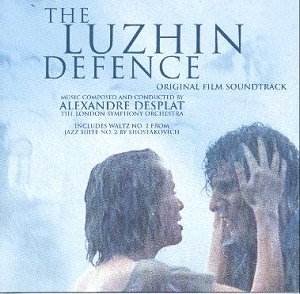| **************************************************************
EDITOR’s CHOICE November 2000
************************************************************** |
Alexandre
DESPLAT
The Luzhin Defence
 OST, The London Symphony
Orchestra conducted by the composer
OST, The London Symphony
Orchestra conducted by the composer
 SILVA SCREEN FILMCD
345
[56:16]
SILVA SCREEN FILMCD
345
[56:16]
Amazon
UK

Just as I was thinking that 2000 was a really fallow year with no really
impressive new film music, along comes this score and restores my faith in
the genre. The score is a misty, dreamy romantic evocation. The opening 'The
Luzhin Defence' begins with gently rippling figures for harp and piano
introducing an enchanting theme at a slow cantering pace which is redolent
of Slavic nostalgia. This theme gains in intensity and it really gets under
one's skin. The 'Love Theme' for Luzhin, the unworldly chess master (John
Turturo) and Natalia (Emily Watson) is beautifully gossamer tender, vulnerable,
and idealistic. 'Arrival' haunts too, a sparkling little gem of restrained
excitement and anticipation. 'Memories of Russia' is a complex cue beginning
with crystalline sparkle suggestive of a sleigh ride Then comes a glassy
stillness disturbed by washes of piano and harp chords with a solo violin
and a sinister deep pedal sounding a disturbing sour note. This is a marvellous
cue: very evocative and atmospheric.
Dancing on the Lake' introduces some restrained ragtime jazz for what one
might imagine to be a rather refined tea dance among potted palms. 'Alexander
and Natalia' tentative at first but tenderly romantic reprises some earlier
material. 'The Dark Side of Chess' introduces nightmare images of intellectual
combat and stress. Desplat displays all Luzhin's mental demons in chilly
fashion without recourse to crude synth effects. 'The Red Dress' is another
poignantly romantic cue, dream-like and full of yearning. 'Leaving Childhood'
is another impressive track with its piano figures supported by pizzicato
strings suggesting a balalaika; but this is deeply emotional music, in arresting
rhythmic shifts, predominantly string-based, with celeste forward suggestive
of early childhood traumas, wolfish nightmares played out against an icy
background.
'Luzhin Dreams' is contrastingly ethereal and gentle. 'I Need a Defence'
with disonances and quirky effects and zithers is nervous and edgy and those
mental monsters (a bit Jaws-like) are lurking in the shadows. 'Natalia's
Eyes' has subtle variations of foregone material and quite varied material
including washes of harp arpeggios and a lovely bouncy, lilting waltz for
piano and orchestra. 'Valentinov' is tense and combative for the actual chess
game which continues into 'The Glass King', crystalline yet arcane and deep,
with infinitely sad music speaking of chill isolation and mental torture.
'Checkmate', the final cue, seems to indicate resignation before there comes
a reprise of the main themes.
Source music is that Shostakovich Waltz No. 2 from his Jazz Suite No.
2, that Kubrick selected for Eyes Wide Shut. Here the playing
is not so refined. For unashamed romantics -- look no further.
Ian Lace

![]()
![]()
![]()
![]()
![]()
![]()
![]()
![]()
![]()
![]()
![]()
![]()
![]()
![]()
![]()
![]()